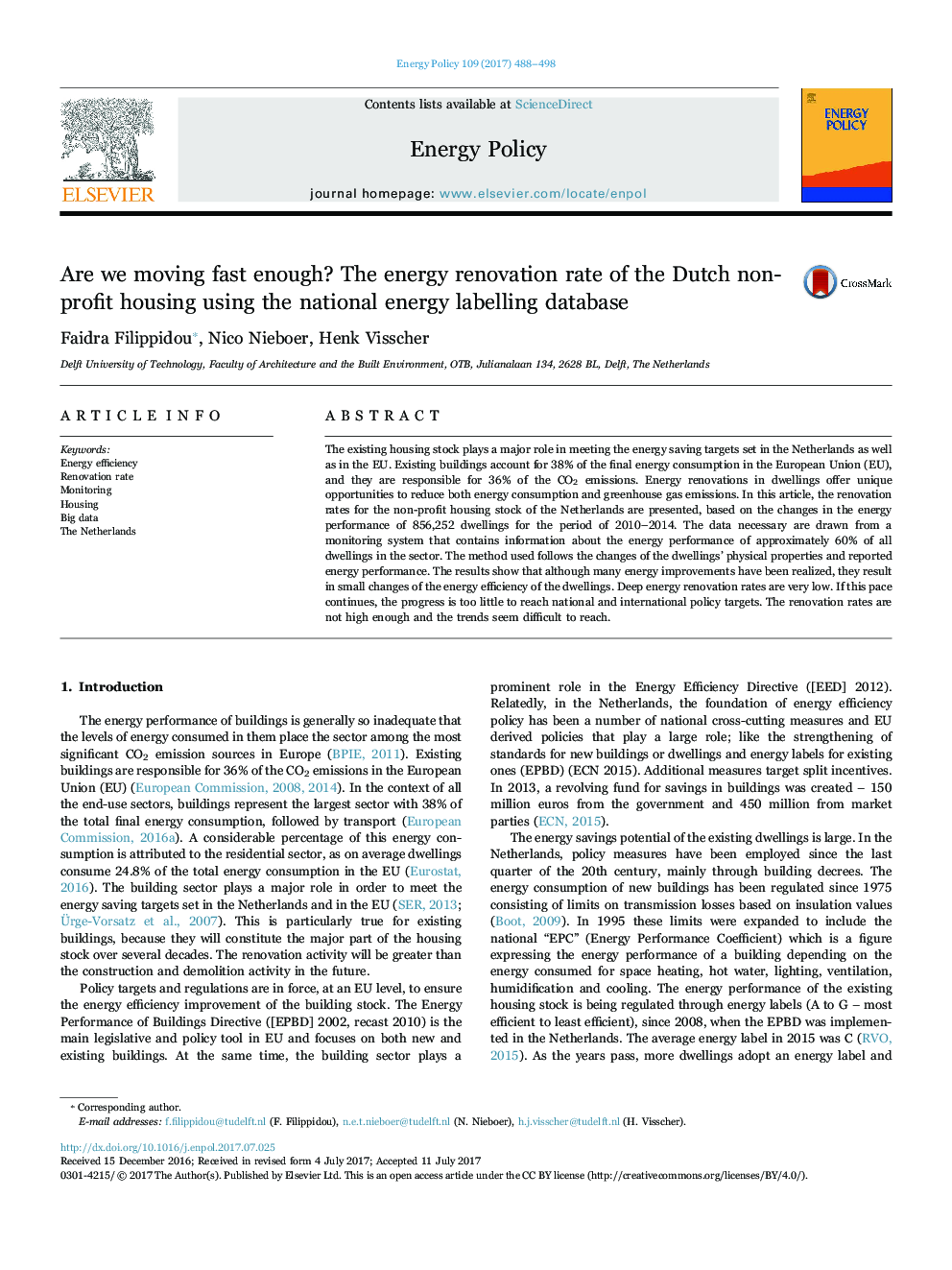| کد مقاله | کد نشریه | سال انتشار | مقاله انگلیسی | نسخه تمام متن |
|---|---|---|---|---|
| 5105690 | 1481249 | 2017 | 11 صفحه PDF | دانلود رایگان |
عنوان انگلیسی مقاله ISI
Are we moving fast enough? The energy renovation rate of the Dutch non-profit housing using the national energy labelling database
ترجمه فارسی عنوان
آیا ما به اندازه کافی سریع حرکت می کنیم؟ میزان نوسازی انرژی مسکن غیرانتفاعی هلندی با استفاده از پایگاه داده های برچسب انرژی ملی
دانلود مقاله + سفارش ترجمه
دانلود مقاله ISI انگلیسی
رایگان برای ایرانیان
کلمات کلیدی
بهره وری انرژی، نرخ نوسازی، نظارت بر، مسکن، اطلاعات بزرگ، هلند،
ترجمه چکیده
سهام مسکن موجود نقش مهمی در برآورده ساختن اهداف صرفه جویی در انرژی در هلند و همچنین در اتحادیه اروپا ایفا می کند. ساختمان های موجود 38 درصد از مصرف انرژی نهایی در اتحادیه اروپا را تشکیل می دهند و 36 درصد از انتشار گازهای گلخانه ای را شامل می شوند. بازسازی انرژی در خانه ها فرصت های منحصر به فردی برای کاهش مصرف انرژی و انتشار گازهای گلخانه ای می دهد. در این مقاله، بر اساس تغییرات در عملکرد انرژی 856،252 مسکن در دوره 2010-2014، نرخ بازسازی سهام غیرانتفاعی هلند ارائه شده است. داده های مورد نیاز از یک سیستم نظارت که حاوی اطلاعات در مورد عملکرد انرژی تقریبا 60 درصد از کل مسکن در بخش است، گرفته شده است. روش مورد استفاده به دنبال تغییرات خواص فیزیکی مسکن و عملکرد انرژی گزارش شده است. نتایج نشان می دهد که اگرچه بسیاری از پیشرفت های انرژی به دست آمده است، آنها منجر به تغییرات کوچکی در کارایی انرژی خانه ها می شوند. نرخ نوسازی انرژی عمیق بسیار کم است. اگر این سرعت ادامه یابد، پیشرفت برای دستیابی به اهداف سیاست ملی و بین المللی خیلی کم است. نرخ نوسازی به اندازه کافی بالا نیست و روند برای رسیدن به آن دشوار است.
موضوعات مرتبط
مهندسی و علوم پایه
مهندسی انرژی
مهندسی انرژی و فناوری های برق
چکیده انگلیسی
The existing housing stock plays a major role in meeting the energy saving targets set in the Netherlands as well as in the EU. Existing buildings account for 38% of the final energy consumption in the European Union (EU), and they are responsible for 36% of the CO2 emissions. Energy renovations in dwellings offer unique opportunities to reduce both energy consumption and greenhouse gas emissions. In this article, the renovation rates for the non-profit housing stock of the Netherlands are presented, based on the changes in the energy performance of 856,252 dwellings for the period of 2010-2014. The data necessary are drawn from a monitoring system that contains information about the energy performance of approximately 60% of all dwellings in the sector. The method used follows the changes of the dwellings' physical properties and reported energy performance. The results show that although many energy improvements have been realized, they result in small changes of the energy efficiency of the dwellings. Deep energy renovation rates are very low. If this pace continues, the progress is too little to reach national and international policy targets. The renovation rates are not high enough and the trends seem difficult to reach.
ناشر
Database: Elsevier - ScienceDirect (ساینس دایرکت)
Journal: Energy Policy - Volume 109, October 2017, Pages 488-498
Journal: Energy Policy - Volume 109, October 2017, Pages 488-498
نویسندگان
Faidra Filippidou, Nico Nieboer, Henk Visscher,
